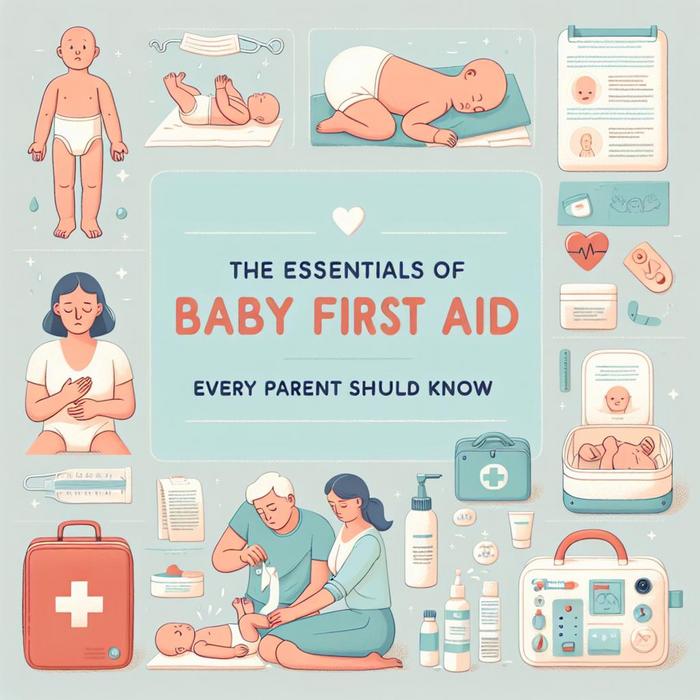Understanding Baby First Aid
As a new parent, you dive into a world filled with joy, responsibility, and inevitable worry. Among these responsibilities is ensuring the safety and health of your precious little one. Here’s where understanding baby first aid becomes essential.
Why Baby First Aid is Important
Baby first aid is not merely a set of steps to follow in emergencies. It’s a lifesaving skill that each parent must learn to handle unexpected situations properly. The knowledge of baby first aid can make the difference between a minor issue and a major health crisis. Being prepared can also help alleviate parental anxiety, knowing that you have the tools and abilities necessary to protect your child when required.
Essential Items for Your Baby’s First Aid Kit
When it comes to baby first aid, having a well-stocked first aid kit is crucial. Here are some of the must-have items:
- Thermometer
- Infant paracetamol and ibuprofen
- Antibacterial ointment
- Bandages of different sizes
- Alcohol-free cleansing wipes
- Nasal aspirator
- Hydrocortisone cream (for rashes)
- Aloe vera gel (for burns)
These are only the basics. You can find a more comprehensive list of items and their uses on The Bump’s guide to making a baby first aid kit. You can also purchase pre-made first aid kits specifically designed for babies on Amazon.
Basic Baby First Aid Skills Every Parent Should Learn
Having a well-equipped first aid kit is one thing, but knowing how to use those resources effectively is another. Here are a few vital baby first aid skills that every parent should learn:
- CPR for babies
- Choking relief
- How to handle falls and injuries
- Dealing with burns
- Treating cuts and scrapes
- Identifying symptoms of common illnesses
While learning from online sources can provide a good baseline, attending a professional baby first aid course is highly recommended. These courses provide hands-on learning experiences that can be crucial in an emergency situation.
Preparation is the Key
While nobody likes to think about their baby getting hurt or sick, it is important to prepare for any potential emergencies. From mastering diaper changes to protecting your baby’s eyesight, and choosing the right pediatrician, baby first aid is another vital skill parents must embrace in their journey. Not only will this knowledge equip you with the confidence and competence to handle emergencies, it will also offer peace of mind knowing that your baby is in safe hands.
Building a Comprehensive Baby First Aid Kit
As highlighted above, some items are absolutely essential in a baby first aid kit. However, let’s delve deeper into a more comprehensive list of supplies that can cover a broader range of eventualities:
- Cool packs for bruises or swelling
- Children’s pain reliever (Check with your pediatrician for specific recommendations)
- Antihistamine cream or liquid
- Oral rehydration solution for diarrhea and vomiting
- Pedialyte popsicles for hydration
- Emergency contact numbers (Including poison control)
- First Aid guide or manual
- Infant-safe sunblock
- Bite and sting relief solutions
- Cotton balls and swabs
- Safety pins for securing bandages
- A portable, insulated bag for easy travel
Remember, the first aid kit must be kept out of a child’s reach to prevent accidental misuse of any components. Moreover, always check expiration dates and replace items regularly to keep the kit fully stocked and up-to-date.
Baby First Aid Courses and Resources
While written resources, online research, and general parental instinct can go a long way, there’s no substitute for hands-on training in baby first aid. Enroll in a baby first aid and CPR course, which often cover essential topics such as recognition of symptoms, handling emergencies, and providing effective relief.
Check out your local Red Cross website, community center, or hospital for upcoming courses. Online courses may also be available. Websites like What To Expect offer comprehensive guidance, ranging from what to include in your baby first aid kit to how to handle major emergencies. Online mom community forums like Moderately Granola Moms also offer real-world advice and personal experiences from other parents.
When to Seek Medical Help
One more piece of advice that every first-aid-trained parent needs is when to seek professional medical help. Websites like KidsHealth provide guidance, but in general, if your child is bleeding excessively, is having difficulty breathing, has fallen and is unconscious or behaving strangely, immediate medical intervention is necessary. No matter how well-stocked your first aid kit is or how extensive your first aid knowledge, there are situations when the assistance of trained medical personnel is indispensable.
Being prepared with baby first aid knowledge and tools doesn’t replace medical professionals, but it does empower you to confront emergencies with a bit more calmness, control, and confidence. Baby first aid is one more way of expressing love and dedication as a parent, equipping you with added peace of mind and readiness for whatever parenthood throws your way.
Remember, being prepared is always the best defense.

